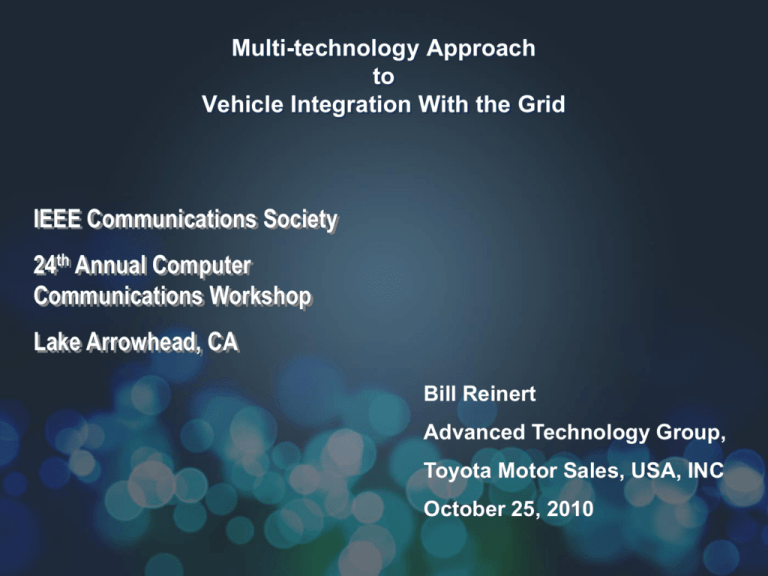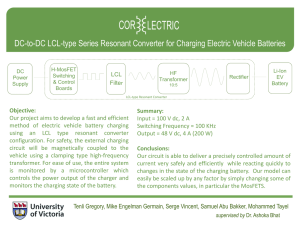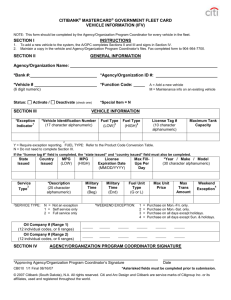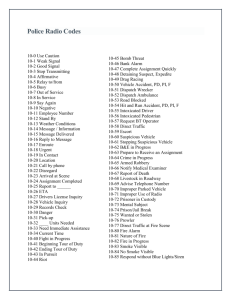Tech Training Slide Template - IEEE Communications Society
advertisement

Multi-technology Approach to Vehicle Integration With the Grid IEEE Communications Society 24th Annual Computer Communications Workshop Lake Arrowhead, CA Bill Reinert Advanced Technology Group, Toyota Motor Sales, USA, INC October 25, 2010 Agenda Future Society Future Energy Future Vehicles On One Hand: Growing Megacities (>10M) Today – 2 4 Additional by 2050 New York, NY 18.65M Atlanta, GA Chicago, IL Los Angeles, CA 12.22M Dallas – Fort Worth, TX Miami, FL 2006 citymayors.com Urban Mass Transport Solutions Light Rail Personal Rapid Transit Developing Solutions For The Last Mile Problem iReal Winglet CityCar On the Other Hand: Populations are Spreading Geographic Distribution of Job Share 98 Metro Areas, 1998 - 2006 2/3 of US jobs, 3/4 economic output, are within 35 mi of 98 largest central business districts (CBD). Increasingly, they are moving to a ring 10-35 mi from CBD. (Brookings Inst.) Most Commutes Are Suburb to Suburb Metropolitan Flow Map (Millions of Commuters) Source Brookings Inst. Unique US Urbanization and Transportation Trends • US Vehicle Miles Traveled grows with US economy • Jobs and housing are decentralizing (despite efforts to do the opposite) • Commute distance increasing (often between suburbs of metro area) • Highway car remains critically important to US Fifty-year US Travel and Economic Trends 400 20 15 10 5 0 1981 1991 2001 National Highway Travel Survey 2001, US Bureau of Transportation Statistics Omnibus Household Survey 2003, ABC News/Time magazine/Washington Post poll 2005 Percent (%) Change since 1960 Person Trip Length (miles) One-way Commute Distance 350 Personal Income (2000 $) 300 Vehicle Miles Traveled 250 200 150 Population 100 50 0 Gas $/Gal CPI Adj. -50 1960 1965 1970 1975 1980 1985 1990 1995 2000 2005 GDP: US Bureau of Economic Analysis, chained 2000 dollars; VMT: “Highway Statistics 2007” Table VMT-421, FHWA; Population: US Census; Gas Price: “Short Term Energy Outlook-October 2009” US Energy Information Administration, annual prices scaled by US CPI in 2008 2010 Agenda Future Society Future Energy Future Vehicles Oil Prices Strongly Influenced by Excess Capacity Oil Production Forecast Oil Price Forecast 120,000,000 Excess Capacity Spare capacity 100,000,000 b/d 80,000,000 Price Opec Biofuels 60,000,000 CTL NGLs GTL 40,000,000 20,000,000 Non Opec Canadian tar sands 2020 0 1980 1990 2000 2010 2020 2030 Platform Design 2040 Cheap Oil Expensive Oil Scarce Oil Source: Neftex (Dr. Peter Wells) Finding replacements part 1 Water use (gallons) Land use Energy ratio CO2 emissionsa Fuel source Transportation energy displacement Acresb Fraction of U.S. cropland gallons of fuel per acre MMBTUe of fuel per acre per gallon of fuel per MMBTU of fuel BTU input per BTU of fuel lb per MMBTU of fuel Conventional gasoline 0-100% a few thousand very low - - 5 45 0.05 175 Conventional diesel 0-100% a few thousand very low - - 10 80 0.08 175 10% 4,100 25% 10,300 very low ~4.4 M ~500,000 3 24 ~0.5 ~380 50% 20,600 CNG 0-100% a few thousand very low - - n/a ~10d ~0.1 d ~150 Heavy crude 0-100% a few thousand very low - - ~10 ~80 ~0.25 ~200 10% 7,500c 25% 19,000c very low ~20 M ~65,000 ~6 ~45 ~0.15 ~240 50% 37,000c 10% 48,000c 25% 120,000c low ~3 M ~350,000 ~5 ~38 ~0.25 ~180 50% 240,000c Coal-to-liquid In situ oil shale Tar sands Source: Kreider and Associates Finding replacements part 2 Water use (gallons) Land use Fuel source Transportation energy displacement Acresb Energy ratio CO2 emissionsa Fraction of U.S. cropland gallons of fuel per acre MMBTUe of fuel per acre per gallon of fuel per MMBTU of fuel BTU input per BTU of fuel lb per MMBTU of fuel Conventional gasoline 0-100% a few thousand very low - - 5 45 0.05 175 Conventional diesel 0-100% a few thousand very low - - 10 80 0.08 175 10% 65 M 20% 370 28 170 2200 0.98 350 25% 160 M 51% 370 28 180 2300 0.98 350 50% 337 M 103% 360 28 220 2900 0.98 350 10% 46 M 15% 515 39 146 1900 0.92 330 25% 112 M 35% 515 39 146 1900 0.92 330 50% 228 M 72% 510 39 149 1900 0.92 330 10% 253 M 80% 57 7 900 6900 0.76 240 25% 380 M 120% 57 7 900 6900 0.76 240 50% 1.2 B 390% 57 7 900 6900 0.76 240 10% 2.5 M < 1% 6000 800 50 400 0.2 25% 6.5 M 2% 6000 800 50 400 0.2 50% 13 M 4% 6000 800 50 400 0.2 0-100% tens of thousands very low - - 5 65 0.6 Corn-based ethanol Cellulosic ethanol Soybean biodiesel fuel Algaculture MSW-based ethanol Source: Kreider and Associates absorbs CO2 waste ~105 Agenda Future Society Future Energy Future Vehicles PHV Role: EV Mode For Short Distance HV Mode for Longer Trips U.S. Driving Patterns (%) 100 Cumulative percentage of personal automobile trips 80% Trips Cumulative percentage of travel distance energy 50 Approx. 35% Approx. 20% 0 20 40 60 80 100 120 140 Average Daily Travel Distance per Vehicle (miles) Source: 1990 Nationwide personal transportation survey Toyota’s PHV Development Operation Specifications Electric Vehicle Charger Assembly HV Battery Engine Household Outlet AC 110 V to 220 V Electric Vehicle Charger Cable Assembly Electric Motor Max. Output In EV Driving Mode Engine 98 HP (73 kW) MG2 80 HP (60 kW) Max. Speed Approx. 62 mph (100 km/h) Range Approx. 13 miles (21 km ) Power Source Household Electrical Outlets Charging Time Approximately 3 hrs (110 V) HV Battery Cooling Additional fans New ductwork 42 Temperature Sensors Intake Air Ducts HV Battery Temperature Sensors (for HV Battery Pack) DC/DC Converter Cooling Blower HV Battery Temperature Sensors (for Intake Air Duct) Sub 2 Main Sub1 HV Battery Cooling Blowers Toyota’s PHV Introduction Scenario Step by Step approach, dependent on Battery Development ‘07 ‘08 ‘09 ‘10 Field Test Phase Test car (10) Field Data Understand market potential Small demo Accumulate Field data (150) Medium volume (~25K) Accumulate Field data Mass volume Battery NiMH Li Li (Revised) Li (Adv) Last Century Urban Mobility Projects Toyota e-Com shared-use ‘community’ EVs for employees Crayon System pay-as-you-go public EV rentals New Urban Mobility – EV Concept Range: 50 miles Charge Time: ~ 2.5hr/7.5hr (220V/110V) 2012 Transition in Personal Mobility Mobility based on Multiple Modes • Car Sharing • Personal Rapid Transit Transition will require: 1. Real-time Communication from Vehicle a) to customer (web portal, Smart Phone) b) to utilities 2. Shift to other modes of personal transportation 3. Partnerships Mobility based on Personal Automobile • Mass Rapid Transit Technology Enables New Possibilities Wireless Technology Promotes Modal Diversity Locate Mass Transit Eco Technology Conserves Energy, Reduces CO2 Smart Grid Convergence of: • Wireless Computing • Consumer Electronics • Transportation • Energy Management • Eco-impact Metrics Zipcar Available? Locate Charge Station Smarter Charging Stations PEV ENABLERS Recommend Monitor optimal mode to minimize price & travel time Charge Status Vehicle to Grid Car Sharing is Growing Currently at 70+ U.S. college campuses U.S. Car Sharing Growth Forecast Members (000s) 8 mm Potential 8,000 7,000 6,000 5,000 4,000 3,000 2,000 200k+ Current Members 1,000 0 2007 ~2020 Fox Business 2008 (70 Campuses); Innovative Mobility Research 2007 (current members), CNW Research 2008 (8 million forecast) For Plug-in Cars To be Successful Key Infrastructure Issues Remain Vehicle to Grid Communications Electric Utilities have excess electricity generation capacity during off-peak hours – typically at night Even during off-peak times, however, there is insufficient electricity distribution capacity for many PEVs to charge at the same time Communication between vehicle and “grid” is necessary to avoid negative impacts to distribution system (such as local outages) Level 2 Charging Equipment The majority of customers, particularly larger-capacity BEVs (50+ miles), will need/want L2 (220V) charging at home and business The installation of L2 charging equipment is extremely challenging: high cost, lengthy time period, complex interactions among City, Utilities, Contractor, Customer, OEM and Dealer Resolving L2 installation issues will be critical for EV market adoption Last Mile Grid System not Developed Old Transformers Cannot Accommodate Multiple EVs Charging in One Neighborhood Night Time Charging Limits Charging Hours Public Charging Not Assured “What the Market will Bear” 2008 Midsize Car Prices Mass Market 25% 25% Prius 20% 20% 15% 15% 10% 10% Prius PHV 5% 5% 0% -5000 -25,000 -- 30000 30,000 -- 35000 35,000 -- 40000 40,000 -- 45,000 00 to 5000 to 10,000 10000-- 15,000 15000-- 20,000 20000-- 25000 45000-2500 7500 12,500 17,500 22,500 27,500 32,500 37,500 42,500 47,500 2499.9 7499.9 to to to to to to to to 12499.9 17499.9 22499.9 27499.9 32499.9 37499.9 42499.9 47499.9 Source: PIN The U.S. market is primed for light PHVs . . . . . if oil prices play along Source: Lux Research The Obama administration has made EVs an agenda item… Energy Plan from Campaign - Key Points Put 1 million plug-in hybrid and/or electric vehicles on the road by 2015 Ensure 10% of energy comes from renewable sources by 2012 and 25% by 2025 Implement economy-wide capand-trade program to reduce greenhouse gas emissions 80% from 1990 levels by 2050 Progress vs. Campaign Promises Congress passed energy legislation in 2009 to reduce U.S. emissions below 2005 levels (Senate has not voted on legislation) 17% reduction by 2020 83% reduction by 2050 American Recovery and Reinvestment Act included $2.4 billion in funding for battery development and electric vehicle component …backed by significant financial commitments Advanced Tech Vehicles Manufacturing Loan Program American Reinvestment & Recovery Act Awards Measured in USD Millions Measured in USD Millions 26,000 25,000 24,000 ATVM provides loans for the cost of re-equipping, expanding, or establishing manufacturing facilities in the United States to produce advanced technology vehicles or qualified components, and for associated engineering integration costs 22,000 20,000 18,000 16,000 2,600 2,400 16,545 1,200 10,000 1,000 465 1,636 Tesla Nissan NA 1,247 800 600 5,801 4,000 2,000 24 465 1,600 12,000 6,000 347 1,800 1,400 529 2,410 2,000 14,000 8,000 81 2,200 35 400 235 ARRA provides funding for U.S.-based manufacturers to: • Produce batteries and components • Produce electric drive components such as electric motors and power electronics 200 0 0 Ford Source: U.S. Department of Energy Fisker Tennec Not AVMIP o Distribute Fundin d g Cell, Batt, and Mtls Mfg Adv Elec Adv Batt Drive Veh & Supp Compo Trans Mfg nent Electr Oth Not er Distribu ted Tot al However, past presidential agenda items such as solar power have struggled once funding was cut Estimated Department of Energy Solar Funding USD Millions Measured in 2007 Dollars Photovoltaic Concentration 1977 - 1979: President Carter makes multiple speeches touting solar power and installs panels on roof of White House 350 325 300 Shipments of Solar Thermal Collectors Measured in Millions of Square Feet Square Feet Medium-Temp Low-Temp (Millions) 19.4 20 18.6 18 16 275 250 14 225 12 200 7.2 11.1 10.9 11.9 10 175 President Reagan cuts funding for solar development 150 125 100 75 4 50 2 25 0 1975 1980 1985 1990 1995 2000 5.0 8 6 0 1970 16.4 2005 2010 5.8 1.9 1976 1978 4.9 4.1 0.7 2.5 1.1 7.5 1.3 5.9 0.1 3.9 1.1 1974 6.2 12.2 4.5 3.8 3.3 3.6 1980 1982 1984 1986 1988 1990 Source: Sissine, “Federal Spending for Solar Energy”, Congressional Research Service July 11, 2008; EIA “Solar Thermal Collector Shipments by Type, Price, and Trade 1974 - 2007 Strong Regulatory Push: Reduce CO2 CARB 2050 Vision CARB Assumptions: Retail Price Increase Versus 2035 Hybrid 2035 Plug-in Hybrid (30 mile AER) $3,400 2035 Battery Electric (100 mile range) $5,500 2035 Fuel Cell $2,800 Sources: California Air Resources Board; “[ZEV] White Paper” CARB expects BEV/FCV sales volume to surpass conventional gas by 2035 and reach 30% of mix by 2040 However, the above vision does not achieve the 80% reduction in GHG emissions from 1990 levels by 2050; ZEVs will need to reach 100% of vehicle sales by 2040, to meet the 80% goal EV Costs vs CO2 Reduction Outside Voices: Evaluation of PHVs, Duke University Duke University, Plug-in and regular hybrids: A national and regional comparison of costs and CO 2 emissions. Comparison of Vehicle Powertrain Technologies Lifetime emissions Lifetime energy use CO2 equiv SOx NOx Hg lb lb lb lb MMBTU Gasoline (30mpg Sentra) 140,000 150 160 0.00084 721 EV-40 (Current US Grid) 110,000 430 210 0.00190 339 PHEV-20 (Reduced Volt) 100,000 270 160 0.00120 409 HEV (2010 Prius) 97,000 140 120 0.00071 472 Fuel Cell (70mi/kg) 76,000 4,100 53 0.00047 626 Comparison of Vehicle Powertrain Technologies Lifetime energy use breakdown FC HEV PHEV-20 EV-40 Gas 17% 17% 20% 25% 11% Vehicle assembly 3% 3% 4% 5% 2% Fuel production / transport 10% 10% 9% 5% 12% Vehicle operation 63% 63% 59% 54% 71% Vehicle maintenance 3% 3% 3% 4% 2% Vehicle disposal 4% 4% 5% 7% 3% 100% 100% 100% 100% 100% Material production Total Roles of EV/PHEV/FCV Private use Vehicle Size ICE HV & PHV Sector High-Speed, Long-Distance Driving Med-to-High Speed, Med-Distance Driving Lower-Speed, Short-Distance Driving Med/Large vehicles EV sector Highway driving between cities Light vehicle Electric welfare vehicle Public transport FCV Sector Large truck Delivery truck HV Scooter City bus Bicycle EV commuter PHEV Microbus Delivery vehicle Low-Speed, Inter-City Driving PMR Driving distance Winglet i-series Electricity Gasoline, Diesel, Biofuel, etc Mobility-based Vehicle-based Hydrogen Summary Apply existing technologies in new ways Most of the technologies mentioned already exist, just not yet in the mobility space For now smaller battery approaches are more cost effective Implies multiple charge periods throughout the day At the end of the day, customer is king All solutions must solve customers problems without creating new ones Charging solutions to manage the grid may be at odds with customer expectations.







